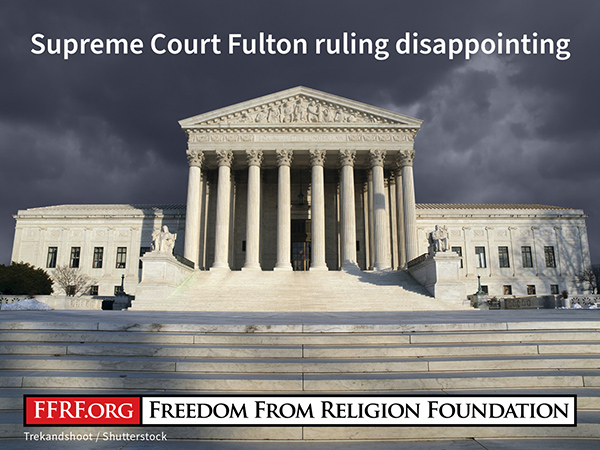
The Freedom From Religion Foundation is disappointed in the U.S. Supreme Court’s narrow decision today in favor of taxpayer-funded discrimination by a religious group, but is relieved that it isn’t worse.
In Fulton v. City of Philadelphia, the Supreme Court in a unanimous decision has ruled that the city infringed on a Catholic charity’s free exercise of religion. However, the court issued a narrow ruling that focused only on the contract language used by the city.
The city of Philadelphia stopped contracting with Catholic Social Services because it refused to work with same-sex couples for foster care screening services, in violation of the city’s anti-discrimination policy. The Catholic entity lost before both the district court and the 3rd U.S. Circuit Court of Appeals. Unfortunately, the increasingly activist Supreme Court took the case.
The court had exhibited worrisome signs in November during oral arguments that it could issue a sweeping decision in favor of the Catholic charity and its ability to discriminate against same-sex couples while participating in a government foster care program. Those arguments highlight that the decision could have been much more unwelcome.
“It is distressing that a unanimous Supreme Court would seemingly bless the Catholic group’s brazen demand to be funded with tax dollars to carry out invidious discrimination,” says FFRF Co-President Annie Laurie Gaylor. “However, it is a relief to see that this narrow decision is likely to have a limited impact.”
Chief Justice John Roberts, joined by five other justices, found that the city’s contract could not survive constitutional review because it provided an option for “discretionary” exceptions to the city’s nondiscrimination rules. From a practical standpoint, the city may be able to change its contract so that it is clear that the nondiscrimination rules apply to all providers and that there aren’t individual exceptions.
Catholic Social Services had asked the Supreme Court to overturn Employment Division v. Smith, which provides that generally applicable laws do not violate the Free Exercise Clause if they have a rational basis. The group also claimed that the nondiscrimination rule violated its “free speech” rights. The high court refused to address these questions and said that it “need not” revisit the Smith decision in this case.
“Catholic Social Services seeks only an accommodation that will allow it to continue serving the children of Philadelphia in a manner consistent with its religious beliefs; it does not seek to impose those beliefs on anyone else,” the decision concludes. “The refusal of Philadelphia to contract with CSS for the provision of foster care services unless it agrees to certify same-sex couples as foster parents cannot survive strict scrutiny, and violates the First Amendment.”
The court’s judgment has a perplexing logic, FFRF emphasizes.
“The Supreme Court’s narrow decision may allow nondiscrimination provisions to stand if governments do not provide for individual exceptions,” says FFRF Senior Counsel Patrick Elliott. “The city of Philadelphia may have a simple fix to this issue by deleting the exception language from its contracts.”
FFRF filed an amicus brief in the case (with Elliott as the counsel of record) strongly opposing the contention of Catholic Social Services that it can discriminate as a government contractor. “If CSS is permitted to discriminate in this case, the rights of religious minorities and the nonreligious would be put in peril,” FFRF observed in its brief.
“Though today’s ruling was limited to the facts of this specific case, it still demonstrates an alarming trend among justices of the court in their willingness to expand privileges to Christians.” says FFRF Legal Director Rebecca Markert. “Under this ruling, Catholic Social Services is still eligible to participate in the foster care program certifications, and still allowed to discriminate against same-sex couples. We’re glad the decision wasn’t worse, but the LGBTQ community deserves better.”
